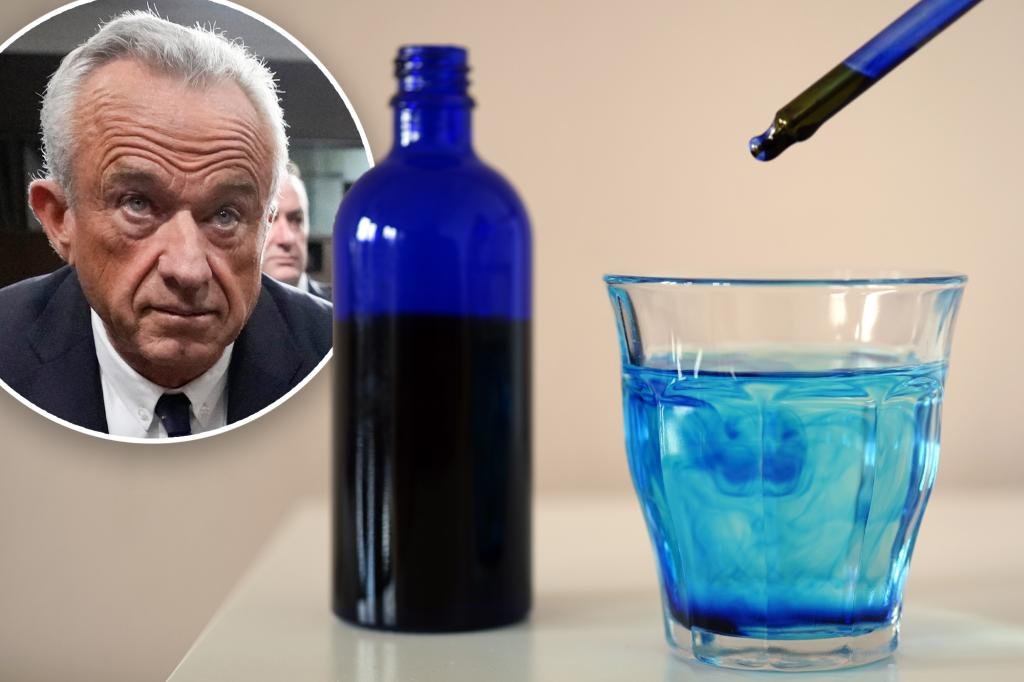
Longevity enthusiasts are buzzing after reports surfaced that Robert F. Kennedy Jr. may be a fan of methylene blue.
President Donald Trump’s pick to lead the Department of Health and Human Services was recently filmed adding mysterious blue droplets to his glass mid-flight. Though he wasn’t seen drinking it, the clip — shared on X by the account American AF — quickly went viral, racking up over 20.4 million views.
Naturally, internet sleuths are on the case. Kennedy hasn’t confirmed what the liquid was, but many are speculating that it’s methylene blue, which one user called “one of the best-kept secrets in biohacking.”
Kennedy’s team did not immediately respond to The Post’s request for comment.
What is methylene blue?
Methylene blue, considered the first fully synthetic drug used in medicine, was originally developed as a textile dye. Its potential medical benefits began to catch the eye of researchers in the 1890s, particularly as a malaria treatment.
Today, the substance — which can be injected or consumed orally — is approved for treating methemoglobinemia, a rare condition where blood loses its ability to carry oxygen throughout the body.
What are the potential benefits?
In recent years, celebrities, wellness influencers, and biohackers have touted methylene blue for several off-label uses, claiming it can boost energy levels and metabolism, enhance cognitive function, and combat aging — though evidence remains limited.
Early research suggests that methylene blue may have antioxidant properties that help reduce toxic proteins in the brain, potentially aiding in the prevention of neurodegenerative diseases like Alzheimer’s and Parkinson’s.
Some studies also indicate that the drug may help delay skin aging by stimulating the production of collagen and elastin, reducing cellular damage, and promoting wound healing.
However, experts caution that more research is needed to determine if it is both safe and effective for these purposes.
Which biohacking influencers are on the bandwagon?
Methylene blue has gained significant traction in the biohacking community, with popular influencers such as Gary Brecka, Pavel Stuchlik and Dave Asprey promoting its potential benefits online.
In response to the video of Kennedy, Brecka suggested on X that methylene blue can help improve “mitochondrial function,” boost cognitive performance and memory, enhance oxygen delivery to tissues, and protect the brain from oxidative stress.
“When used correctly, it’s a game-changer for mental clarity and longevity!” he wrote.
Dr. Jason Sonners, a hyperbaric medicine expert with a large online following, has also spoken publicly about methylene blue. Though he doesn’t take it daily, Sonners said he uses it frequently when traveling.
“I use it primarily when I travel — one, because it helps me stay in a fasted state for a longer period of time, and two, because of its anti-microbial characteristics,” he explained in a video on Instagram. He also uses it when he needs to power through a heavy workload, finding it enhances his cognition and focus.
“I do recommend cycling it: taking it for periods of time, not taking it for periods of time,” Sonners advised.
What are the potential downsides?
While early research points to some benefits outside its approved uses, many doctors have raised concerns about the risks of using methylene blue, especially without medical supervision.
Canadian physician Dr. Jon cautioned his TikTok followers against taking the drug, warning it can cause potentially deadly complications for people who also take anti-depressants. He also dismissed some claims that it could be beneficial in treating cases of COVID-19.
The Cleveland Clinic lists common side effects of methylene blue, including blue urine, nausea, vomiting, skin discoloration, dizziness, and headaches. Some studies also suggest that taking it in large doses may increase the risk of cancer.
As with any supplement, experts strongly recommend consulting with your doctor before trying methylene blue, particularly if you’re on other medications, have kidney issues, or a glucose-6-phosphate dehydrogenase deficiency. Pregnant or breastfeeding women should also be cautious.


Recent Comments